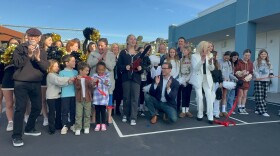In his two decades as a software engineer 54-year-old Robert Cunningham has ridden the waves of other economic downturns. During the dot com boom and bust he watched employers fold, lost jobs, picked up and moved on. So, when he was laid off two years ago, he was expecting more of the same.
“I went from full time to part time two years ago and that ended 18 months ago in June," Cunningham said. "So I did have some warning that I’d be going to zero income, but I always thought, oh, I’ll get another job – didn’t happen.”
At first he filled his time just like any job seeker would.
“After the initial shock, getting the resume up to speed, getting on to all the online jobs sites. You do that for a couple months and then you realize, oh, I’ve hit all the high tech in San Diego.”
At that point Cunningham could have just gotten discouraged and depressed. A lot of people do.
“We see some people just kind of holed up in their house," said David Peters, a family and marriage therapist with a private practice in Mission Valley. "They'll be eating poorly, sleeping poorly, maybe drinking and doing nothing but watching TV, which is one of the worst things you could do in terms of a reaction, because the need to take action is so great.”
Peters tells patients to get creative about ways to make some kind of income. That could mean organizing neighbors’ closets or looking to freelance their professional skills. But, he also tells them it's important to focus on more than work.
“Get lots of exercise because it wards off depression and it helps keep the brain in top shape,” Peters said.
Cunningham knows the benefits of regular exercise well. Once his job hunt slowed a friend got him to join the Triathlon Club of San Diego and now his weeks look a lot different.
“Monday afternoons I do a strength training workout and then I do a run, that’s Monday and Wednesday. Then Tuesday mornings I ride Point Loma and then do a short, two-mile run," Cunningham said, rattling off his workout routine. "Then on the weekends, Saturday morning I do a 30-mile bike ride with the triathlon club. And, I do a couple of ocean swims and those are one or two miles in the water. So, actually, that sounds like a lot when you add it up. I don’t know if I’ll ever be able to find a job to support that lifestyle.”
He’s still looking for engineering jobs and said taking on triathlon has kept the depression he has experienced much of his life at bay. For Cunningham that means he’s more competitive when he does get interviews.
“Being depressed in an interview – it’s impossible to succeed," he said. "You have to make an emotional connection. You have to be very alert – listening very closely, responding not just to the technical content of a question, but the emotional overtones of it, because they want to feel you out as a person.”
Triathlon training isn’t for everyone, though. Instead of physically remaking himself, Scott Atkinson decided to go back to school at age 55, after 30 years as a mechanical designer. He’s getting a degree in 3D graphic design for video games. But, making that decision took a while.
"Probably six months," he said. "Because I was really nervous about the financial implications. I’m living pretty close to the bone and was pretty concerned about getting any deeper into debt. And, I knew nothing about trying to get myself through grant and scholarship searches and all of that.”
Atkinson has taken money out of his retirement accounts and says he scrimps on everything now, from canceling magazine subscriptions to skipping trips to the dentist. He’s still looking for jobs that use his old skills to carry him through his three-year degree. But – pursuing a new career gives him something positive to focus on.
“It’s very satisfying to make a decision on a future course of action and start working at it – that’s very exciting," he said. "I definitely see it as the silver lining. I think I was about ready to make a change anyway because the work was very stressful and I really didn’t enjoy it.”
A willingness to be creative and flexible can help any job seeker, not just someone looking to change careers or lifestyles, according to Peters.






